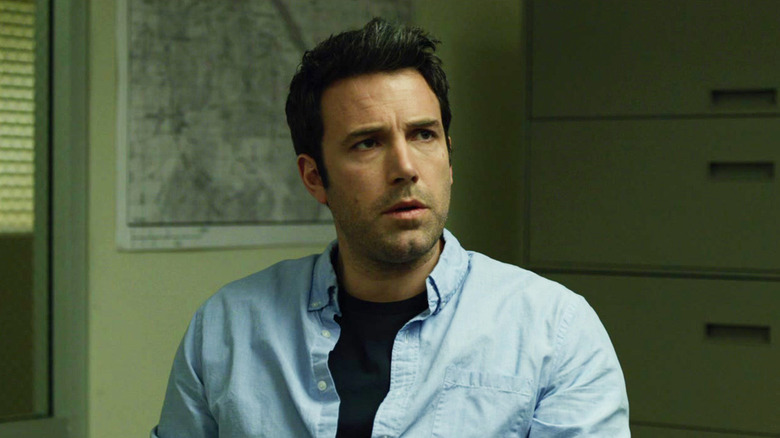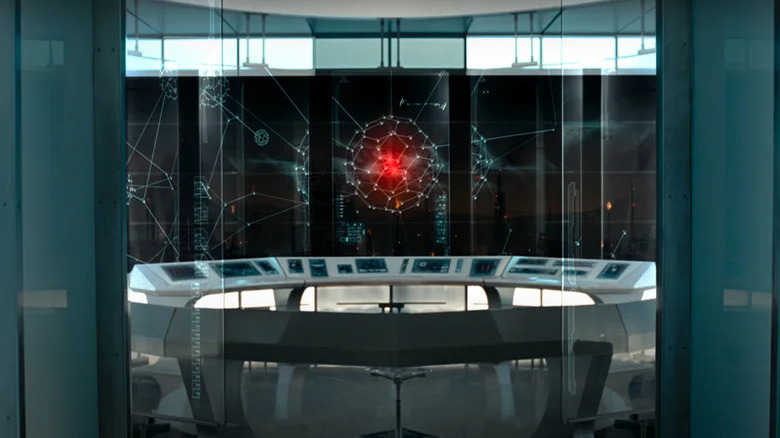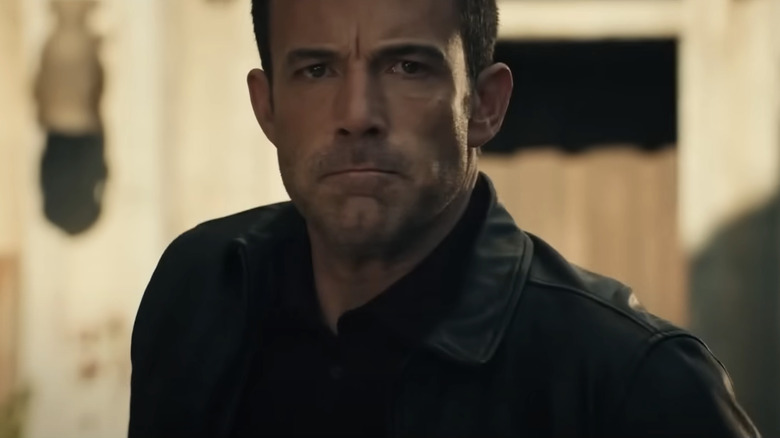Ben Affleck Points Out The Flaws That Will Keep AI From Taking Over Movies
AI has been haunting the film industry for some time, but has become a particularly pressing topic in the last year or so. One of the central issues at the heart of the 2023 writers' and actors' strikes, the rise of generative AI has proven to be truly a contentious development, and not just with writers looking to make sure their work isn't used to train some machine to emulate their work.
Until very recently, the threat of AI seemed to belong to a distant future when something akin to Skynet would become self-aware and we'd all find ourselves in some sort of post-apocalyptic nightmare world battling chrome skeleton robots with human teeth. Such a development would, in real-world terms, be thought of as the arrival of Artificial General Intelligence (AGI) — the type of AI that can adapt to multiple tasks just like a human. But the opposite, so-called Narrow AI, is what we have powering the chatbots and AI art generators that have proliferated in recent years. This form of the technology can only carry out specific tasks for which it's trained, but it turns out that in and of itself is enough to cause consternation the world over, and it's already changing multiple aspects of modern life, from the aforementioned strikes to confusing us all with fake songs from popular musicians and even churning out what I think are cool examples of visual media that, if they weren't made by tech trained on other people's work, could be considered their own form of art.
Thus far, we've heard plenty of pontificating about how AI will affect our lives moving forward, particularly when it comes to movie-making. Joe Russo, for instance, imagines an AI-driven garbage future where the filmmaker is replaced by our individual desires to place ourselves inside stories that pan out exactly how we'd like. I've also written about the potential for awful AI movies to dominate our future, something which a company called TCLTV+ then immediately brought closer to reality with the trailer for an ungodly AI-generated rom-com.
Now, however, Ben Affleck has waded into the discourse, and thankfully he's a lot more sanguine about the future of AI and the movie industry.
Ben Affleck thinks movies will be one of the last things replaced by AI
At a time when the filmmaker who warned us about the rise of AI is now embracing it and movies are being made which demonstrate why AI filmmaking is a terrible idea, it feels like we desperately need a more cheerful take on the future. Apparently, Ben Affleck is the one to provide it. The actor/director spoke to "Squawk on the Street" co-anchor David Faber at CNBC's "Delivering Alpha" event (via Variety), where he laid out a vision of the future that would see AI used in a much more pragmatic and careful way than some AI doomers have suggested. The "Air" star stated quite plainly that "movies will be one of the last things, if everything gets replaced, to be replaced by AI."
Why? Well, because as Affleck sees it, the technology is much more likely to be used to "dis-intermediate the more laborious, less creative, and more costly aspects of filmmaking that will allow costs to be brought down." Instead of being used as a way of actually creating film and TV projects from the ground up, in Affleck's view, the technology will be serving a practical purpose, helping to bring existing projects to fruition rather than completely taking over — mostly because, as the actor sees it, AI in its current form is just copying existing products and methods. He continued:
"AI can write you excellent imitative verse that sounds Elizabethan. It cannot write you Shakespeare. The function of having two actors or three or four actors in a room and the taste to discern and construct, that is something that currently entirely eludes AI's capability and I think will for a meaningful period of time."
In Affleck's view, the ultimate result of this kind of AI implementation will be that "more voices [get] to be heard, [and] that will make it easier for the people who want to make 'Good Will Huntings' to go out and make it."
Is Ben Affleck being too optimistic about AI?
Ben Affleck's view of AI's future usage in the film industry certainly sounds more promising than other takes on the technology. In his view, AI is "a craftsman at best," and is simply "cross pollinating things that exist." As a result, the actor repeated that "nothing new is created," adding:
"Craftsman is knowing how to work. Art is knowing when to stop. And I think knowing when to stop is going to be a very difficult thing for AI to learn because it's taste, and also lack of consistency, lack of controls, lack of quality."
In that sense, Affleck sees the technology as acting as a form of support for movies and TV made by humans in the future. He used the hypothetical example of viewers making their own episode of "Succession," wherein they say, "'I'll pay you $30 and can you make me a 45-minute episode where Kendall gets the company and runs off and has an affair with Stewy?' and it'll do it" — which isn't too far removed from the kind of tailor-made movie experience Joe Russo previously touted. For Affleck, though, it seems as if he sees this aspect of the tech as a kind of promotional tool for the main media itself.
Whether Affleck's view of AI turns out to be true or not, the man has certainly demonstrated a certain savvy for this kind of thing in the past, essentially predicting the rise of Netflix and streaming services all the way back in 2003. Still, the fact remains that until the WGA held out for better terms, the film industry was apparently more than willing to use AI in an unregulated way to produce scripts and rip-off existing material as it saw fit. That already seems like it goes against the "put yourself in the movie" fun and games future envisioned by Ben Affleck. It also seems to give film studios the benefit of the doubt at a time when, as Reuters reports, huge companies such as Disney are establishing entire departments aimed at harnessing the power of AI moving forward. The idea that none of this will lead to any sort of degradation of human-led filmmaking in the future seems hard to believe (just ask voiceover artists), but even then Affleck was willing to admit that he "wouldn't like to be in the visual effects business," claiming that space in particular is "in trouble," adding, "What costs a lot of money is now going to cost a lot less, and it's going to hammer that space, and it already is. And maybe it shouldn't take a thousand people to render something."


